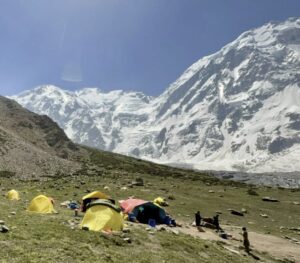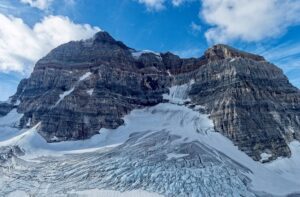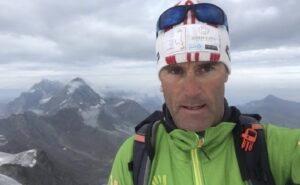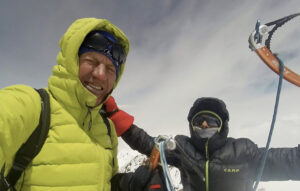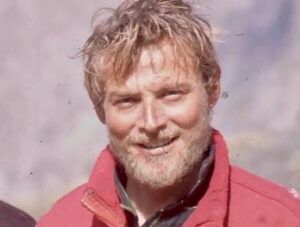Sergi Mingote is currently relaxing at the beach with his wife and daughter, like thousands of other families along the coast of Spain on a hot, slow August. It is unlikely that someone sun-baking next to him will recognize Mingote as the guy who has just been featured on the national news, swaddled in a down suit, sporting mirrored glasses and waving from a knife-edge atop a Karakorum mountain.
Filling his lungs with the rich Mediterranean breeze, the Catalan climber surely enjoys it as only someone who has struggled long and hard in thin air can. Mingote has spent much of the last year and two days panting. It’s how long he needed to climb six 8,000’ers without supplementary oxygen: Broad Peak, K2, Manaslu in 2018, and Lhotse, Nanga Parbat and Gasherbrum II this year.

Before his Mediterranean sojourn, while he was still in Islamabad, ExplorersWeb spoke with Mingote. Even then, fresh from the Karakorum, his voice sounded happy and strong, with no trace of altitude cough or exhaustion. No one would have imagined that he had been up so high for so long.
“Yeah, I am actually fine, totally recovered,” he said. “After all, I’ve been doing what I like most, mountaineering.”

Kinshoffer Wall, Nanga Parbat. Photo: Sergi Mingote
Mingote’s original plan had been to focus on the Gasherbrums this season . But on arriving in Pakistan, he met Ali Sadpara (with whom he climbed on Lhotse). Sadpara suggested Nanga Parbat.
“[It’s] traditionally a peak summited early in the season, compared to those in the Karakorum,” said Mingote. “Sadpara said there would be a couple of teams on Nanga, and although it’s more complex than the Gasherbrums, it’s much more beautiful.”
Once there, Mingote noted the great atmosphere and the cooperation that quickly developed among the teams. Mingote is an old friend of Cala Cimenti, who was planning a ski descent with two partners, and he knew many of those in Nirmal Purja’s group.
“There were very few of us [on the mountain], and in these cases, cooperation is easier,” said Mingote. “But we understood each other perfectly, and when the time came for a summit push, we took shifts breaking trail — mine was between Camps 2 and 3. In my opinion, that’s why we succeeded.”

After Nanga, he dashed over to the Gasherbrums. “We returned to Chilas, and instead of spending the night there, we flew to Skardu, reached Askole the following day and then completed the 120km Baltoro trek in just three days [instead of the usual six].”
He added:
“The same evening I reached Base Camp, I climbed to Gasherbrum I’s Camp 2. Unfortunately, I was alone there, and that night, the weather turned for the worse, so I decided to retreat to Camp 1 and go right away for Gasherbrum II, which I did.”
Mingote said that the mental stress was even harder than the physical effort. ”You are climbing against the clock, and it was the last leg of my project, the 5th and 6th mountains.”

Photo: Sergi Mingote
He had prepared well physically, training in a high-performance center. Its experts continued to advise him while he was in Pakistan. “The key factor was undoubtedly my choice to use no supplementary oxygen, but my familiarity with altitude helped me to adapt.”
“Psychologically, climbing without oxygen is terrible, because you are aware that you are spending a very long time deprived of air, with all the negative consequences to your body. You also know that there are more mountains to come, which will involve more days in the death zone.”
If Mingote ever considered giving Gasherbrum I a second try, he put it aside after he helped Denis Urubko with two rescues on consecutive days. They aided a Lithuanian climber and then a seriously sick porter. “We dragged the poor man from very high on the glacier; that took all the energy left in my body,” Mingote admitted.

Six 8,000ers without O2 from July 2018 to July 2019. Done!
Speaking of records and linking 8,000m summits, we couldn’t help asking Mingote about Nirmal Purja. “Honestly, we’ve been together on both mountains this summer and we have a good relationship,” said Mingote. “I have the utmost respect for his project. The mountains have taught me to be respectful to all approaches.”
“Nims has a different approach than mine. His includes O2 and strong support, but his project is nevertheless amazing.”
“I am not really aware of the image that he projects on social media, but I appreciate him as a person, we’ve got along very well, helped each other and respect each other’s efforts. The really important thing is to be honest, and he openly explains how he does things, as do I.”

Sergi Mingote will be back on the mountains soon. All photos: Courtesy Sergi Mingote
The unavoidable question is, what’s next for Sergi Mingote?
“Well… first of all, I want to spend time with Julia, my daughter, and my wife, Miriam. Then, at the end of August, I’ll make up my mind. I’m receiving some interesting invitations…”
This video summarizes Mingote’s outstanding season in Pakistan:

